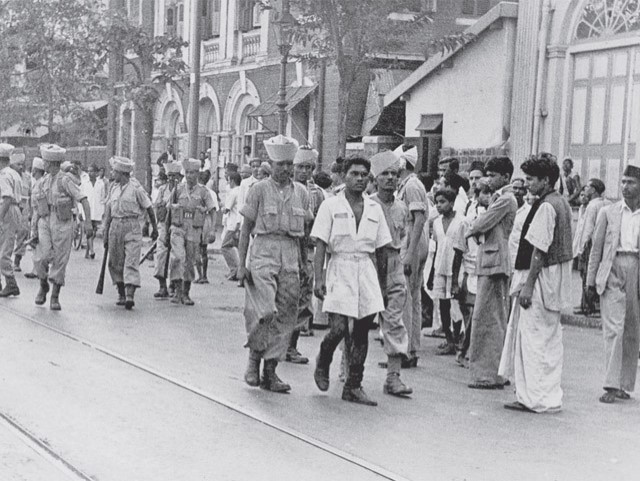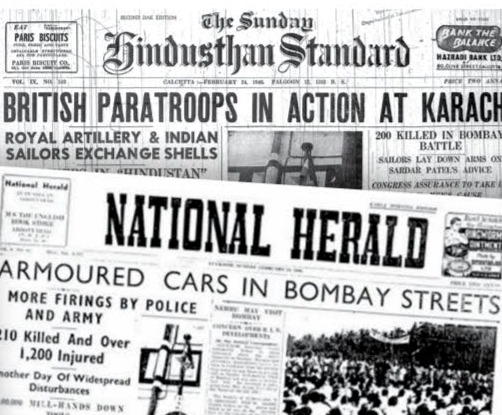
Today is the 76th anniversary of the Royal Indian Naval mutiny. A forgotten chapter in both Indian & Pak History books.
On February 18th 1946, over 20000 Indian sailors of the Imperial Navy rose against the British. The last nail in the coffin of the British Empire.
#Thread



On February 18th 1946, over 20000 Indian sailors of the Imperial Navy rose against the British. The last nail in the coffin of the British Empire.
#Thread




Balai Chand Dutt (BC Dutt) was the man who triggered the 1946 Royal Naval Mutiny. Today, BC Dutt has been erased from Indian History.
A 23-year-old Dutt persuaded his comrades to join the revolt, commencing on February 18th 1946, with a hunger strike on the Ship 'HMIS Talwar'.
A 23-year-old Dutt persuaded his comrades to join the revolt, commencing on February 18th 1946, with a hunger strike on the Ship 'HMIS Talwar'.

Within three days, the revolt spread to nearly 75 others ships and nearly 20,000 Indian sailors joined the Mutiny.
Karachi, Bombay, Kochi, Madras and Calcutta were the focal points of the Mutiny. Indian Sailors began offering left-handed salutes to British superior officers.
Karachi, Bombay, Kochi, Madras and Calcutta were the focal points of the Mutiny. Indian Sailors began offering left-handed salutes to British superior officers.

The Mutiny shook the British Crown and the British had no option but to crush the uprising.
For 350 years, since the defeat of the Spanish Armada, the British Navy was the strongest Navy in the world. Even during WW2, it was the most powerful Navy.
For 350 years, since the defeat of the Spanish Armada, the British Navy was the strongest Navy in the world. Even during WW2, it was the most powerful Navy.
https://twitter.com/thehistoryguy/status/568139309104164865
On Friday, 22nd February 1946, there was a bloodbath at Bombay and a street battle at Karachi.
The Bombay Students’ Union, the mill workers and the Communist Party (CPI) called for a general strike to support the Sailors.
The Bombay Students’ Union, the mill workers and the Communist Party (CPI) called for a general strike to support the Sailors.

Only one Political Party (Communist - CPI) and one National Leader (Aruna Asaf Ali) supported the Mutiny.
The Congress and the Muslim League condemned the Mutiny (an armed revolution according to both parties), and the Mahasabha & RSS just remained mute spectators, like always.
The Congress and the Muslim League condemned the Mutiny (an armed revolution according to both parties), and the Mahasabha & RSS just remained mute spectators, like always.
Balai Chand Dutt, MS Khan, PJ Antony, Madan Singh & A K Hangal were the leaders behind the Mutiny. Khwaja Ahmed Abbas & Balaraj Sahni supported the Mutiny. All forgotten today.
Hangal led the general strike in support of Mutiny in Karachi and narrowly escaped the British firing.
Hangal led the general strike in support of Mutiny in Karachi and narrowly escaped the British firing.

"British Prime Minister Clement Attlee blames the Communists for 1946 Royal Naval Mutiny."
- San Bernardino Sun newspaper on 23rd Feb 1946.
In 1948, the British branded the Mutiny as a larger communist conspiracy raging from the Middle East to Far East against the British crown
- San Bernardino Sun newspaper on 23rd Feb 1946.
In 1948, the British branded the Mutiny as a larger communist conspiracy raging from the Middle East to Far East against the British crown

A Bengali play based on the mutiny, Kallol (Sound of the Wave), by playwright Utpal Dutt was first performed in 1965 in Calcutta. Kallol drew large crowds to the Minerva Theatre where it was being performed.
Kallol was later banned by the government and Dutt was imprisoned.
Kallol was later banned by the government and Dutt was imprisoned.
Today the Mutiny has been forgotten (Erased).
Even after 1947, the governments of Independent India & Pakistan refused to reinstate the sailors who took part in the mutiny or offer them Pension.
Both the Indian & Pakistan politicians & Media don't talk about the mutiny now.
Even after 1947, the governments of Independent India & Pakistan refused to reinstate the sailors who took part in the mutiny or offer them Pension.
Both the Indian & Pakistan politicians & Media don't talk about the mutiny now.
Why did the Mutiny scare the British?
When your own native Armed Forces turn against you, then it's time to leave. The British knew it and were afraid of it since the 1857 revolt.
Historically, the country with the strongest Naval force has ruled the world. #ThreadEnd
When your own native Armed Forces turn against you, then it's time to leave. The British knew it and were afraid of it since the 1857 revolt.
Historically, the country with the strongest Naval force has ruled the world. #ThreadEnd
• • •
Missing some Tweet in this thread? You can try to
force a refresh










